Reflective Journal: Exploring the Accounting Profession - Unit 1B
VerifiedAdded on 2020/04/21
|5
|1061
|144
Journal and Reflective Writing
AI Summary
This reflective journal explores the accounting profession, focusing on its vital role in organizational success and the expanding responsibilities of accountants. The reflection covers the importance of accounting knowledge, diverse job opportunities, and the creation of financial statements for various stakeholders. It analyzes the contextual factors influencing the profession, including economy, regulations, technology, and ethics. The author discusses interactions with management, auditors, and clients, emphasizing the provision of accurate financial information and the importance of ethical conduct. Key skills like analytical abilities and soft skills are highlighted, along with the challenges of establishing trust, managing work-life balance, and adapting to technological advancements and changing standards. References to accounting standards and professional organizations like AICPA, ACCA, and CPA Australia support the analysis, illustrating the dynamic nature of the profession.
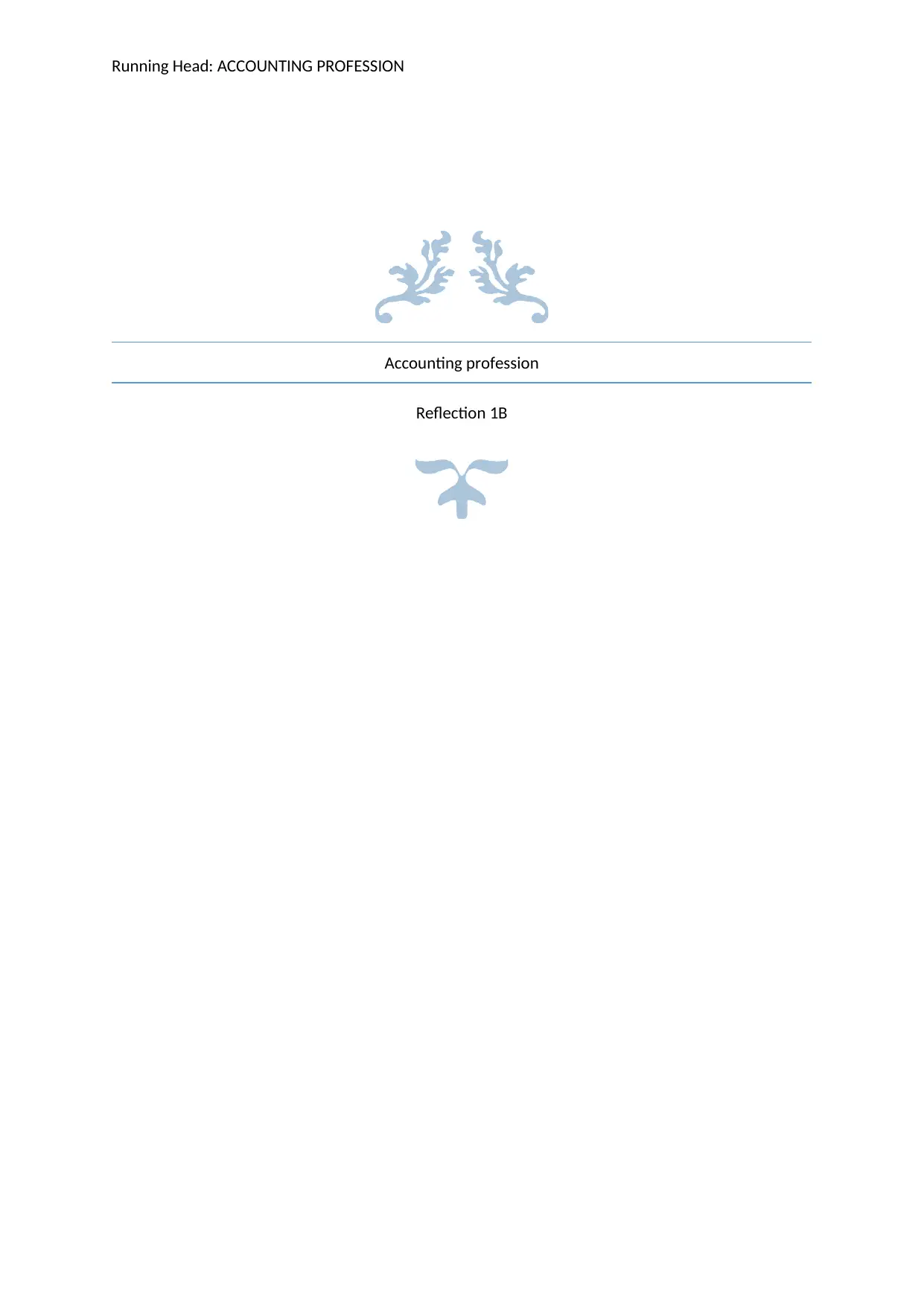
Running Head: ACCOUNTING PROFESSION
Accounting profession
Reflection 1B
Accounting profession
Reflection 1B
Paraphrase This Document
Need a fresh take? Get an instant paraphrase of this document with our AI Paraphraser
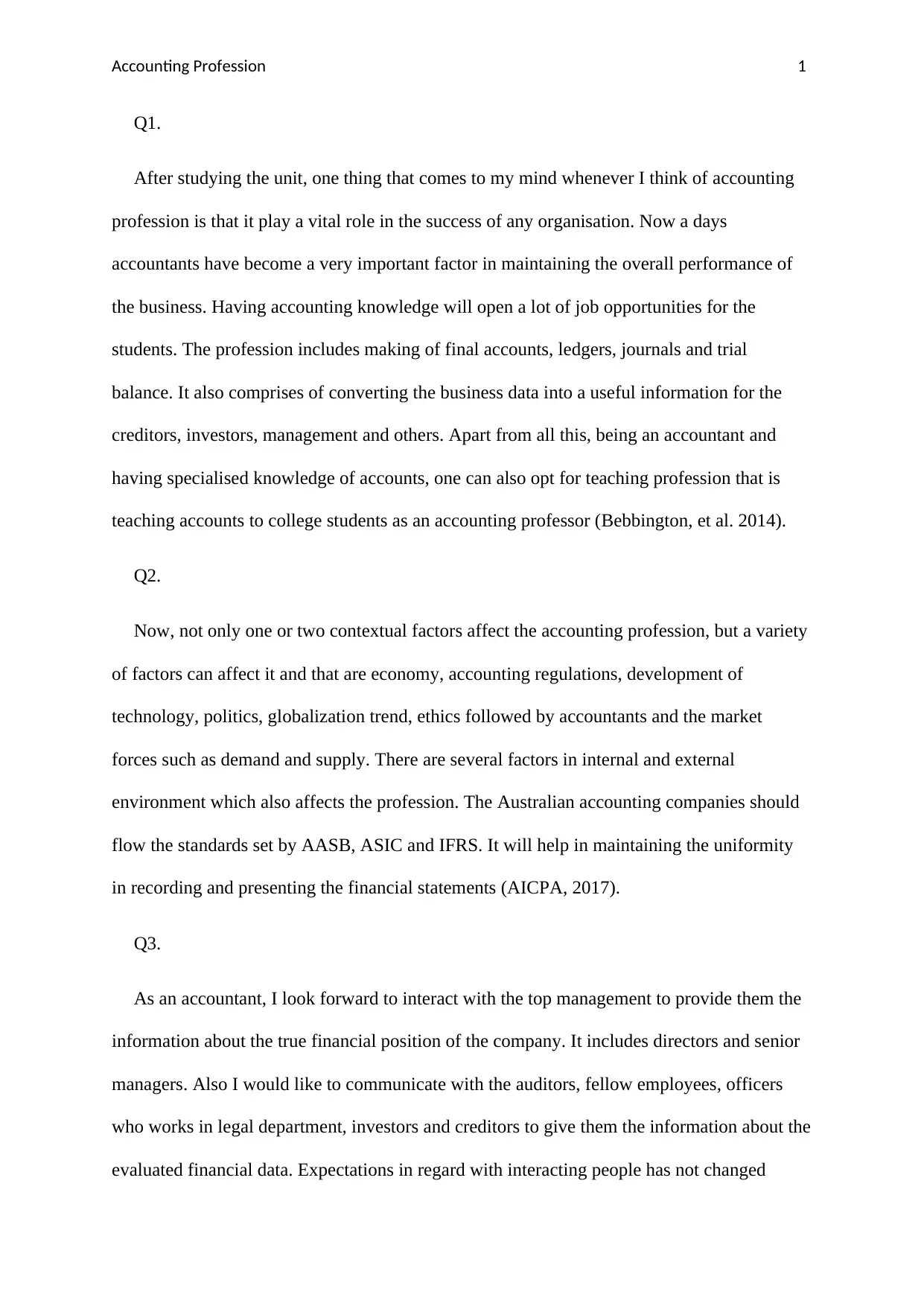
Accounting Profession 1
Q1.
After studying the unit, one thing that comes to my mind whenever I think of accounting
profession is that it play a vital role in the success of any organisation. Now a days
accountants have become a very important factor in maintaining the overall performance of
the business. Having accounting knowledge will open a lot of job opportunities for the
students. The profession includes making of final accounts, ledgers, journals and trial
balance. It also comprises of converting the business data into a useful information for the
creditors, investors, management and others. Apart from all this, being an accountant and
having specialised knowledge of accounts, one can also opt for teaching profession that is
teaching accounts to college students as an accounting professor (Bebbington, et al. 2014).
Q2.
Now, not only one or two contextual factors affect the accounting profession, but a variety
of factors can affect it and that are economy, accounting regulations, development of
technology, politics, globalization trend, ethics followed by accountants and the market
forces such as demand and supply. There are several factors in internal and external
environment which also affects the profession. The Australian accounting companies should
flow the standards set by AASB, ASIC and IFRS. It will help in maintaining the uniformity
in recording and presenting the financial statements (AICPA, 2017).
Q3.
As an accountant, I look forward to interact with the top management to provide them the
information about the true financial position of the company. It includes directors and senior
managers. Also I would like to communicate with the auditors, fellow employees, officers
who works in legal department, investors and creditors to give them the information about the
evaluated financial data. Expectations in regard with interacting people has not changed
Q1.
After studying the unit, one thing that comes to my mind whenever I think of accounting
profession is that it play a vital role in the success of any organisation. Now a days
accountants have become a very important factor in maintaining the overall performance of
the business. Having accounting knowledge will open a lot of job opportunities for the
students. The profession includes making of final accounts, ledgers, journals and trial
balance. It also comprises of converting the business data into a useful information for the
creditors, investors, management and others. Apart from all this, being an accountant and
having specialised knowledge of accounts, one can also opt for teaching profession that is
teaching accounts to college students as an accounting professor (Bebbington, et al. 2014).
Q2.
Now, not only one or two contextual factors affect the accounting profession, but a variety
of factors can affect it and that are economy, accounting regulations, development of
technology, politics, globalization trend, ethics followed by accountants and the market
forces such as demand and supply. There are several factors in internal and external
environment which also affects the profession. The Australian accounting companies should
flow the standards set by AASB, ASIC and IFRS. It will help in maintaining the uniformity
in recording and presenting the financial statements (AICPA, 2017).
Q3.
As an accountant, I look forward to interact with the top management to provide them the
information about the true financial position of the company. It includes directors and senior
managers. Also I would like to communicate with the auditors, fellow employees, officers
who works in legal department, investors and creditors to give them the information about the
evaluated financial data. Expectations in regard with interacting people has not changed
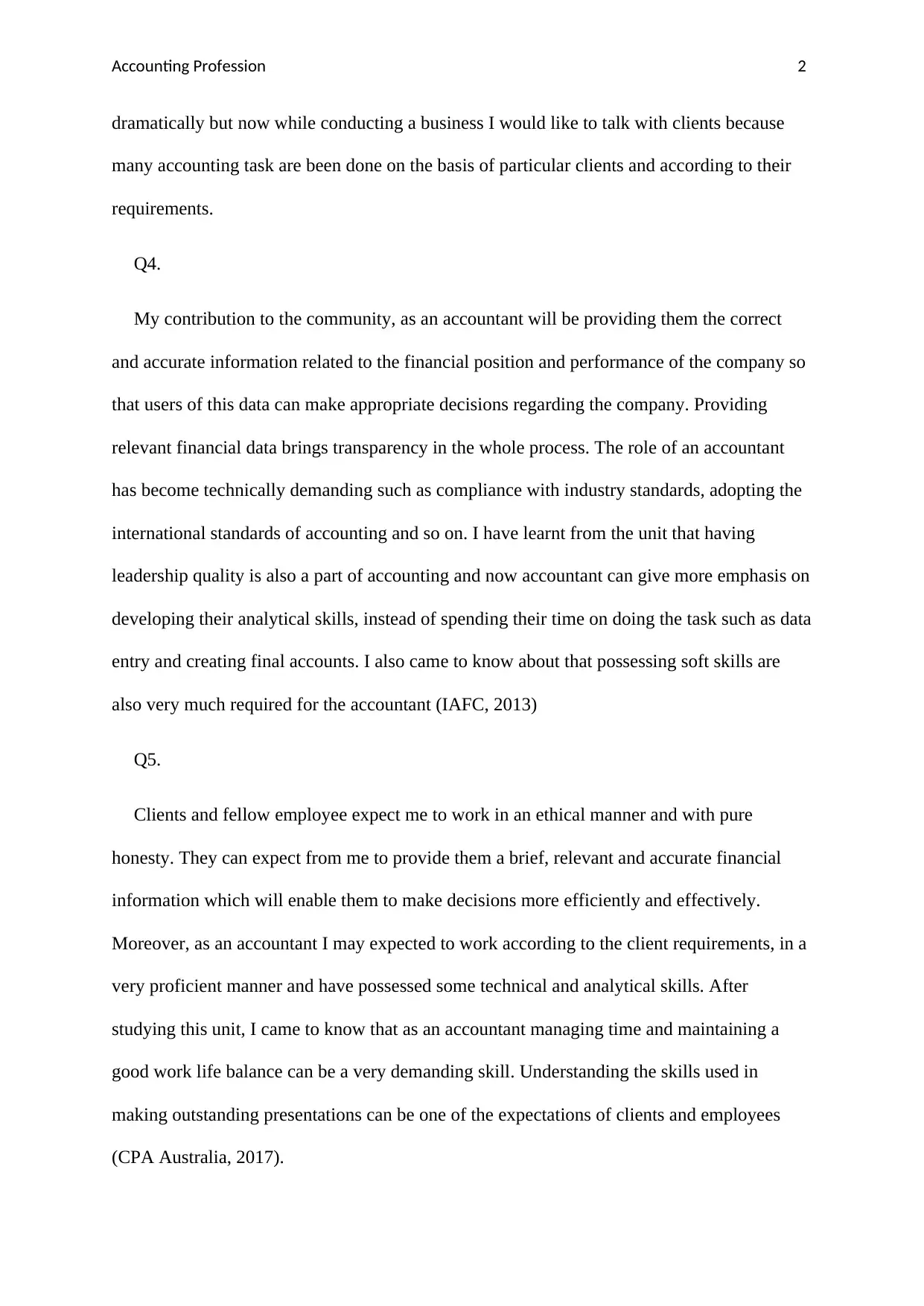
Accounting Profession 2
dramatically but now while conducting a business I would like to talk with clients because
many accounting task are been done on the basis of particular clients and according to their
requirements.
Q4.
My contribution to the community, as an accountant will be providing them the correct
and accurate information related to the financial position and performance of the company so
that users of this data can make appropriate decisions regarding the company. Providing
relevant financial data brings transparency in the whole process. The role of an accountant
has become technically demanding such as compliance with industry standards, adopting the
international standards of accounting and so on. I have learnt from the unit that having
leadership quality is also a part of accounting and now accountant can give more emphasis on
developing their analytical skills, instead of spending their time on doing the task such as data
entry and creating final accounts. I also came to know about that possessing soft skills are
also very much required for the accountant (IAFC, 2013)
Q5.
Clients and fellow employee expect me to work in an ethical manner and with pure
honesty. They can expect from me to provide them a brief, relevant and accurate financial
information which will enable them to make decisions more efficiently and effectively.
Moreover, as an accountant I may expected to work according to the client requirements, in a
very proficient manner and have possessed some technical and analytical skills. After
studying this unit, I came to know that as an accountant managing time and maintaining a
good work life balance can be a very demanding skill. Understanding the skills used in
making outstanding presentations can be one of the expectations of clients and employees
(CPA Australia, 2017).
dramatically but now while conducting a business I would like to talk with clients because
many accounting task are been done on the basis of particular clients and according to their
requirements.
Q4.
My contribution to the community, as an accountant will be providing them the correct
and accurate information related to the financial position and performance of the company so
that users of this data can make appropriate decisions regarding the company. Providing
relevant financial data brings transparency in the whole process. The role of an accountant
has become technically demanding such as compliance with industry standards, adopting the
international standards of accounting and so on. I have learnt from the unit that having
leadership quality is also a part of accounting and now accountant can give more emphasis on
developing their analytical skills, instead of spending their time on doing the task such as data
entry and creating final accounts. I also came to know about that possessing soft skills are
also very much required for the accountant (IAFC, 2013)
Q5.
Clients and fellow employee expect me to work in an ethical manner and with pure
honesty. They can expect from me to provide them a brief, relevant and accurate financial
information which will enable them to make decisions more efficiently and effectively.
Moreover, as an accountant I may expected to work according to the client requirements, in a
very proficient manner and have possessed some technical and analytical skills. After
studying this unit, I came to know that as an accountant managing time and maintaining a
good work life balance can be a very demanding skill. Understanding the skills used in
making outstanding presentations can be one of the expectations of clients and employees
(CPA Australia, 2017).
⊘ This is a preview!⊘
Do you want full access?
Subscribe today to unlock all pages.

Trusted by 1+ million students worldwide
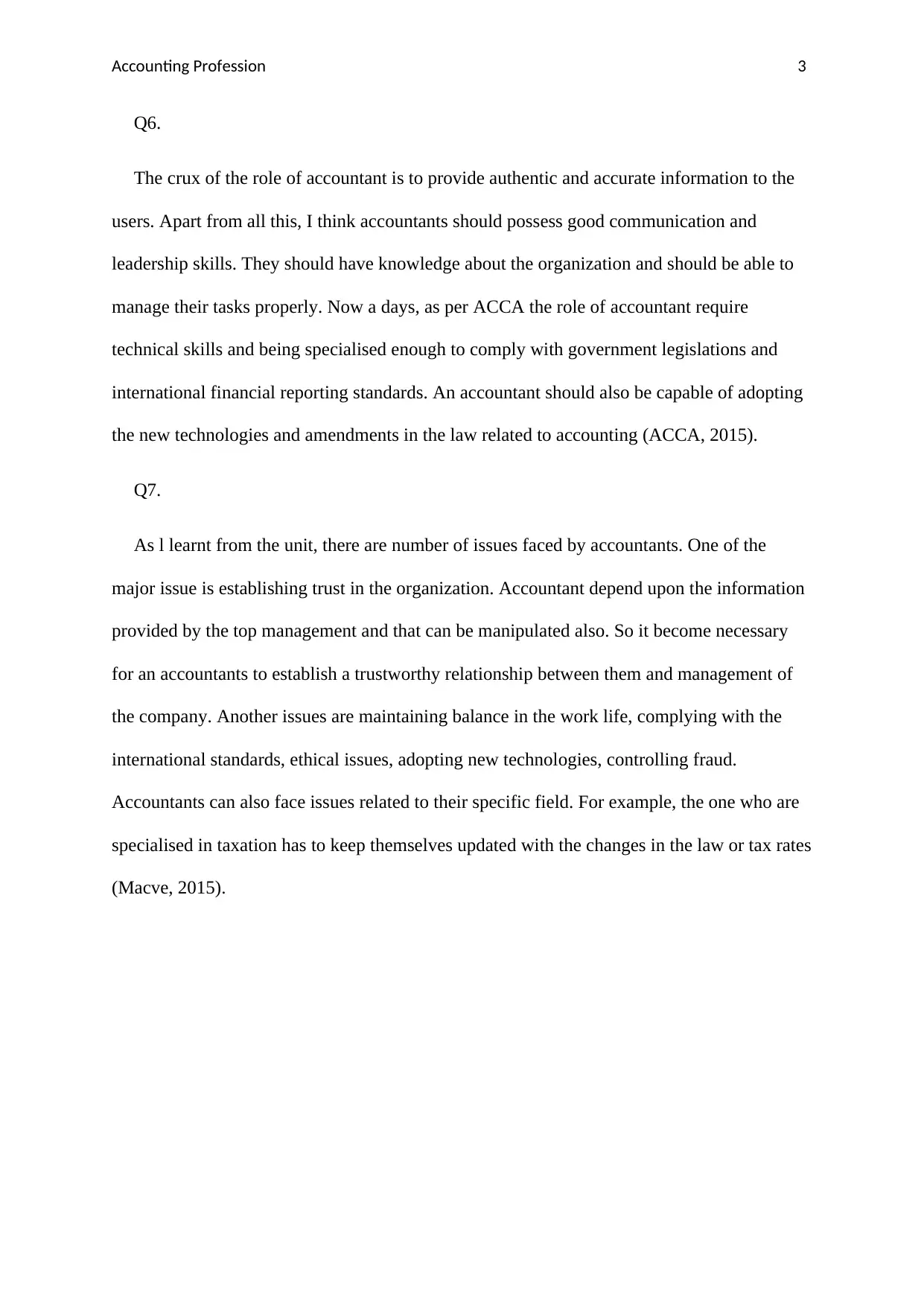
Accounting Profession 3
Q6.
The crux of the role of accountant is to provide authentic and accurate information to the
users. Apart from all this, I think accountants should possess good communication and
leadership skills. They should have knowledge about the organization and should be able to
manage their tasks properly. Now a days, as per ACCA the role of accountant require
technical skills and being specialised enough to comply with government legislations and
international financial reporting standards. An accountant should also be capable of adopting
the new technologies and amendments in the law related to accounting (ACCA, 2015).
Q7.
As l learnt from the unit, there are number of issues faced by accountants. One of the
major issue is establishing trust in the organization. Accountant depend upon the information
provided by the top management and that can be manipulated also. So it become necessary
for an accountants to establish a trustworthy relationship between them and management of
the company. Another issues are maintaining balance in the work life, complying with the
international standards, ethical issues, adopting new technologies, controlling fraud.
Accountants can also face issues related to their specific field. For example, the one who are
specialised in taxation has to keep themselves updated with the changes in the law or tax rates
(Macve, 2015).
Q6.
The crux of the role of accountant is to provide authentic and accurate information to the
users. Apart from all this, I think accountants should possess good communication and
leadership skills. They should have knowledge about the organization and should be able to
manage their tasks properly. Now a days, as per ACCA the role of accountant require
technical skills and being specialised enough to comply with government legislations and
international financial reporting standards. An accountant should also be capable of adopting
the new technologies and amendments in the law related to accounting (ACCA, 2015).
Q7.
As l learnt from the unit, there are number of issues faced by accountants. One of the
major issue is establishing trust in the organization. Accountant depend upon the information
provided by the top management and that can be manipulated also. So it become necessary
for an accountants to establish a trustworthy relationship between them and management of
the company. Another issues are maintaining balance in the work life, complying with the
international standards, ethical issues, adopting new technologies, controlling fraud.
Accountants can also face issues related to their specific field. For example, the one who are
specialised in taxation has to keep themselves updated with the changes in the law or tax rates
(Macve, 2015).
Paraphrase This Document
Need a fresh take? Get an instant paraphrase of this document with our AI Paraphraser
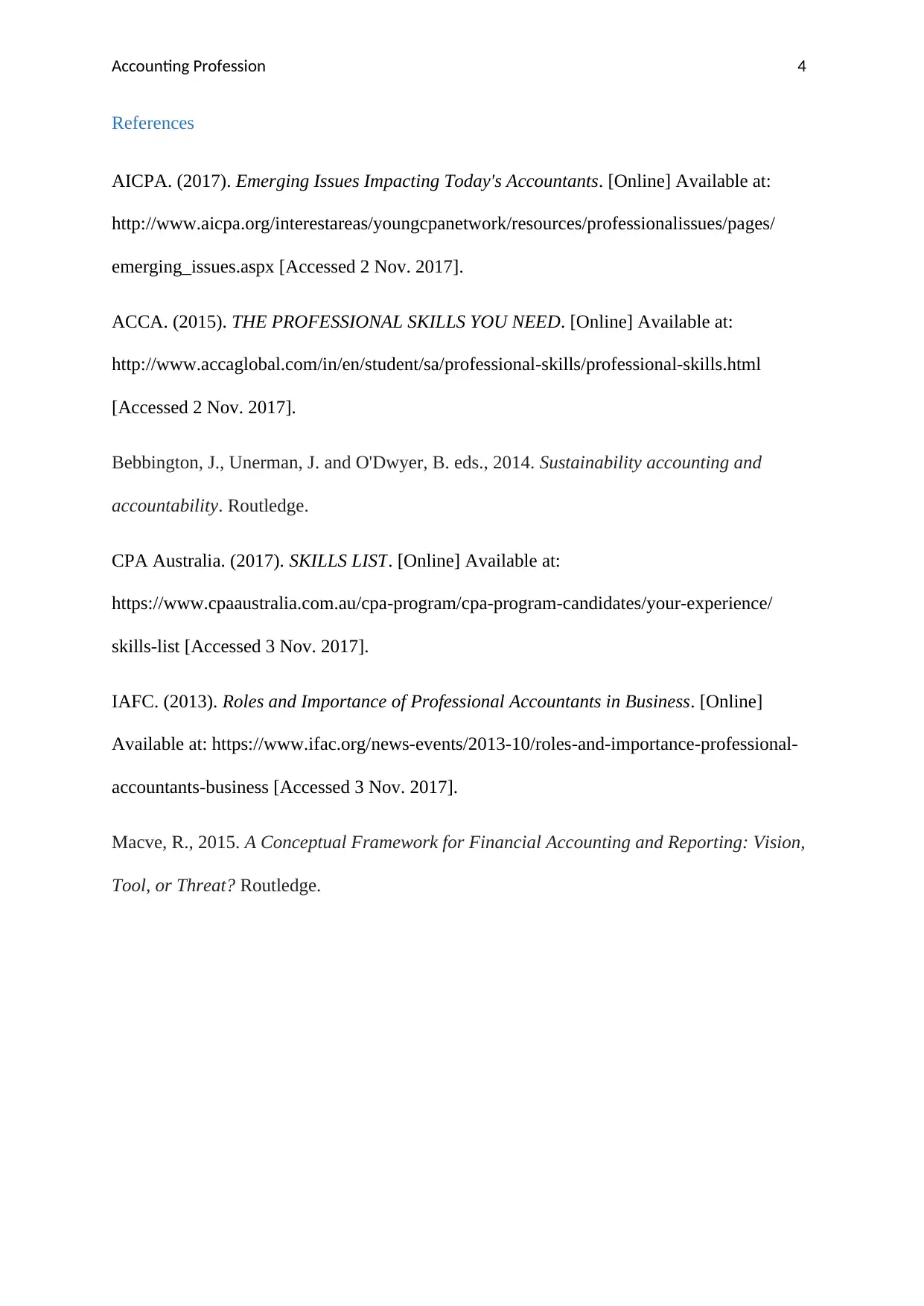
Accounting Profession 4
References
AICPA. (2017). Emerging Issues Impacting Today's Accountants. [Online] Available at:
http://www.aicpa.org/interestareas/youngcpanetwork/resources/professionalissues/pages/
emerging_issues.aspx [Accessed 2 Nov. 2017].
ACCA. (2015). THE PROFESSIONAL SKILLS YOU NEED. [Online] Available at:
http://www.accaglobal.com/in/en/student/sa/professional-skills/professional-skills.html
[Accessed 2 Nov. 2017].
Bebbington, J., Unerman, J. and O'Dwyer, B. eds., 2014. Sustainability accounting and
accountability. Routledge.
CPA Australia. (2017). SKILLS LIST. [Online] Available at:
https://www.cpaaustralia.com.au/cpa-program/cpa-program-candidates/your-experience/
skills-list [Accessed 3 Nov. 2017].
IAFC. (2013). Roles and Importance of Professional Accountants in Business. [Online]
Available at: https://www.ifac.org/news-events/2013-10/roles-and-importance-professional-
accountants-business [Accessed 3 Nov. 2017].
Macve, R., 2015. A Conceptual Framework for Financial Accounting and Reporting: Vision,
Tool, or Threat? Routledge.
References
AICPA. (2017). Emerging Issues Impacting Today's Accountants. [Online] Available at:
http://www.aicpa.org/interestareas/youngcpanetwork/resources/professionalissues/pages/
emerging_issues.aspx [Accessed 2 Nov. 2017].
ACCA. (2015). THE PROFESSIONAL SKILLS YOU NEED. [Online] Available at:
http://www.accaglobal.com/in/en/student/sa/professional-skills/professional-skills.html
[Accessed 2 Nov. 2017].
Bebbington, J., Unerman, J. and O'Dwyer, B. eds., 2014. Sustainability accounting and
accountability. Routledge.
CPA Australia. (2017). SKILLS LIST. [Online] Available at:
https://www.cpaaustralia.com.au/cpa-program/cpa-program-candidates/your-experience/
skills-list [Accessed 3 Nov. 2017].
IAFC. (2013). Roles and Importance of Professional Accountants in Business. [Online]
Available at: https://www.ifac.org/news-events/2013-10/roles-and-importance-professional-
accountants-business [Accessed 3 Nov. 2017].
Macve, R., 2015. A Conceptual Framework for Financial Accounting and Reporting: Vision,
Tool, or Threat? Routledge.
1 out of 5
Related Documents
Your All-in-One AI-Powered Toolkit for Academic Success.
+13062052269
info@desklib.com
Available 24*7 on WhatsApp / Email
![[object Object]](/_next/static/media/star-bottom.7253800d.svg)
Unlock your academic potential
Copyright © 2020–2026 A2Z Services. All Rights Reserved. Developed and managed by ZUCOL.




